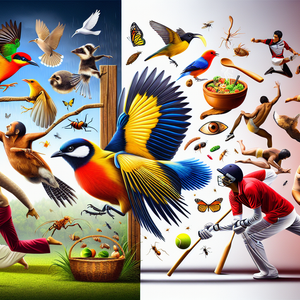The Evolution of Mike Tyson's Persona in Popular Culture

In the late 1980s, Mike Tyson was a force of nature inside the boxing ring. His explosive power and intimidating presence made him a household name, often synonymous with violence and aggression. Tyson's early career was characterized by his ferocity, which culminated in him becoming the youngest heavyweight champion at just 20 years old. His early fights, characterized by quick knockouts, not only showcased his incredible talent but also instilled fear in opponents and spectators alike. However, Tyson's tumultuous personal life, including legal troubles and a prison sentence for rape in the early 1990s, overshadowed his athletic achievements. His fall from grace was swift and brutal; once celebrated as a champion, he became a controversial figure often associated with crime and scandal. Despite these setbacks, Tyson's resilience allowed him to return to the ring, but the public's perception of him had begun to shift. The image of the once-feared champion started to morph into that of a tragic figure, sparking both sympathy and fascination.
Cultural Rebirth: The Shift to Entertainment
Tyson's foray into the entertainment world marked a significant turning point in his persona. In the late 1990s and early 2000s, he began to embrace opportunities outside of boxing, including appearances in films like "The Hangover" and his one-man show, "Mike Tyson: Undisputed Truth." These ventures showcased a different side of Tyson—one that was humorous, self-reflective, and willing to engage with his past. His role in "The Hangover" is particularly noteworthy. By playing a fictionalized version of himself, Tyson not only displayed his comedic chops but also allowed the public to see him in a new light. The film's massive success introduced him to a younger audience, further solidifying his status as a cultural icon rather than just a boxer. Tyson's ability to poke fun at his past, combined with his raw honesty, helped to soften his image and reframe his narrative from one of pure aggression to that of a man who could laugh at himself.
Social Media: The Personal Connection
The advent of social media has further transformed Tyson's persona. Platforms like Twitter and Instagram have given him a direct line of communication with fans, allowing him to share his thoughts, experiences, and even his struggles with mental health. Tyson's candidness about his past, including his battles with addiction and the loss of his daughter, has resonated deeply with followers, fostering a sense of connection and empathy. Tyson's social media presence has also allowed him to redefine masculinity and vulnerability. He often engages in motivational speaking, sharing lessons learned from his tumultuous life, which has endeared him to a broader audience. By presenting himself as a man who has faced and overcome significant challenges, Tyson has transformed from a figure of fear into one of resilience and inspiration. His heartfelt discussions about personal struggles have struck a chord with many, creating a sense of community among his followers.
Legacy and Impact on Popular Culture
Today, Mike Tyson is not just a boxing legend; he is a symbol of redemption and transformation. His journey reflects broader societal changes regarding how we view fame, success, and personal growth. Tyson's ability to navigate the complex landscape of public opinion and reinvent himself has made him an enduring figure in popular culture. Moreover, Tyson's story encourages conversations about mental health, redemption, and the capacity for change. His evolution from a feared boxer to a beloved entertainer serves as a reminder that our past does not have to define our future. Tyson's narrative challenges the traditional notions of masculinity by showing that vulnerability can coexist with strength, thus influencing how society perceives both celebrity and personal struggles.
The evolution of Mike Tyson's persona in popular culture is a testament to the power of resilience and reinvention. From his early days as an intimidating heavyweight champion to his current status as a cultural icon, Tyson's journey is one of transformation that reflects not only his personal growth but also the changing tides of societal values. As he continues to navigate the complexities of fame and identity, Tyson remains an influential figure whose story inspires many to embrace change and seek redemption in their own lives. His ability to redefine himself amidst adversity serves as a powerful reminder that transformation is possible, regardless of one's past.
Sports Marketing Manager
Major sports leagues (e.g., NFL, NBA), sports marketing agencies, and athletic apparel brands
Core Responsibilities
Develop and implement marketing strategies to promote athletes and sporting events, leveraging both traditional and digital media.
Collaborate with sponsors and partners to create promotional campaigns that enhance brand visibility and engagement.
Analyze market trends and audience insights to optimize marketing efforts and maximize return on investment.
Required Skills
Strong understanding of sports industry dynamics and consumer behavior.
Excellent communication and negotiation skills to work effectively with various stakeholders.
Experience with digital marketing tools and social media platforms.
Social Media Content Creator
Media companies, sports teams, and influencers in the entertainment industry
Core Responsibilities
Create engaging and original content for various social media platforms, focusing on trends in sports and entertainment.
Interact with followers to build a community and enhance brand loyalty, using feedback to shape future content.
Monitor social media metrics to measure engagement and inform strategies for content improvement.
Required Skills
Proficiency in graphic design and video editing software (e.g., Adobe Creative Suite).
Strong writing and storytelling skills, with the ability to adapt tone and style for different audiences.
Knowledge of social media algorithms and trends to maximize reach and engagement.
Mental Health Counselor for Athletes
Professional sports teams, athletic departments at universities, and mental health clinics specializing in sports psychology
Core Responsibilities
Provide individual and group therapy sessions to athletes dealing with mental health issues, such as anxiety, depression, and performance pressure.
Develop tailored wellness programs that address the unique psychological needs of athletes and promote overall well-being.
Collaborate with coaches and sports organizations to create a supportive environment for mental health awareness.
Required Skills
A Master’s degree in psychology or counseling with licensure in the relevant state.
Experience working with high-performance athletes or in a sports-related setting.
Strong communication skills and a compassionate approach to counseling.
Event Coordinator for Sports and Entertainment
Event management companies, sports franchises, and entertainment agencies
Core Responsibilities
Plan and execute high-profile events, such as fight nights, celebrity appearances, and promotional tours, ensuring all logistics are managed efficiently.
Coordinate with vendors, sponsors, and venues to deliver a seamless event experience.
Manage budgets, timelines, and post-event evaluations to assess success and areas for improvement.
Required Skills
Strong organizational skills and the ability to multitask in a fast-paced environment.
Excellent negotiation and interpersonal skills to liaise effectively with various stakeholders.
Experience with event management software and tools.
Public Relations Specialist in Sports
PR agencies, sports teams, and corporate sponsors in the sports industry
Core Responsibilities
Manage public relations campaigns that enhance the image and visibility of athletes, teams, and sporting events.
Write press releases, feature stories, and media kits to communicate key messages to the public and media outlets.
Build and maintain relationships with journalists, influencers, and media representatives to facilitate coverage and promote events.
Required Skills
Strong writing and editing skills, with a keen eye for detail and storytelling.
Experience in crisis communication and reputation management.
Knowledge of media landscape and experience in pitching stories to various outlets.


